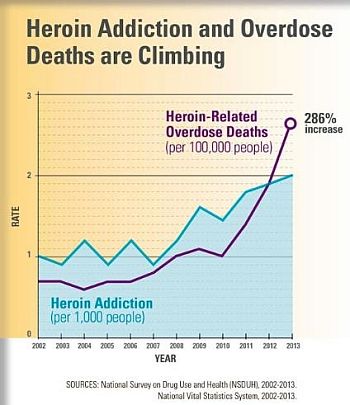
Publisher:
Bonnie King
CONTACT:
Newsroom@Salem-news.com
Advertising:
Adsales@Salem-news.com

~Truth~
~Justice~
~Peace~
TJP
Sep-29-2016 20:50

 TweetFollow @OregonNews
TweetFollow @OregonNews
Oregon Sheriffs and Chiefs of Police Support a New Approach to Drug Possession Crimes
Salem-News.comThey collectively recommend that user-amount drug possession convictions be treated as Misdemeanors.
 As heroin use has increased, so have heroin-related overdose deaths. Between 2002 and 2014, the rate of heroin-related overdose deaths more than quadrupled, and more than 10,500 people died in 2014. Image: CDC |
(SALEM, Ore.) - Sheriff Brian Wolfe, President and Chief Geoff Spalding, President: Oregon Sheriffs and Chiefs of Police recognize that every community and most of our citizens are touched in one way or another by the damaging impacts of drug addiction. We understand that it ruins lives, breaks hearts, burdens families and robs our communities of individuals with potential.
Too often, individuals with addiction issues find their way to the doorstep of the criminal justice system when they are arrested for possession of a controlled substance.
The penalty is often a felony drug conviction where the person may receive a jail sentence, are placed on probation and receive limited treatment services. Unfortunately, felony convictions in these cases also include unintended and collateral consequences including barriers to housing and employment and a disparate impact on minority communities.
Oregon Sheriffs and Chiefs of Police are committed to work with the Governor, Attorney General, District Attorneys, members of the Oregon State Legislature and stakeholders to craft a more thoughtful approach to drug possession when it is the only crime committed.
Oregon Sheriffs and Chiefs of Police recommend that user-amount drug possession convictions be treated as misdemeanors and recommend that offenders be carefully assessed and given individualized, mandated treatment as a condition of their conviction.
If successful, drug abusers will return to health and productivity and will not commit future crimes where they become further entangled in the criminal justice system.
This approach continues to demand accountability while applying limited resources to treatment and services to address the underlying addiction and prevent future crime.
We believe our limited criminal justice resources should be focused on addressing violent crime and property crime problems that destroy community livability.
We do not support any reduction in Community Corrections funding through "savings" for this historic felony level population, as this would undermine current recidivism reduction work and harm community-based efforts that are a result of the state's Justice Reinvestment Initiative.
We believe this newly created misdemeanor population should continue to be funded by the state, and Community Corrections agencies should remain responsible for providing the assessments and subsequent evidence-based treatment service or referrals.
We also believe that our prosecutors must continue to have access to specialty courts like drug court and other accountability tools as we treat these drug possession crimes as Class A Misdemeanors. In many counties, first time drug possession offenders can avoid a felony if they seek and complete treatment.
We must be clear. It is imperative that mandated assessments and treatment services accompany this change in drug crime policy so that individual risks and needs can been identified and addressed.
Source: Oregon State Sheriffs Association
Articles for September 28, 2016 | Articles for September 29, 2016 | Articles for September 30, 2016
Salem-News.com:





Terms of Service | Privacy Policy
All comments and messages are approved by people and self promotional links or unacceptable comments are denied.
[Return to Top]
©2025 Salem-News.com. All opinions expressed in this article are those of the author and do not necessarily reflect those of Salem-News.com.